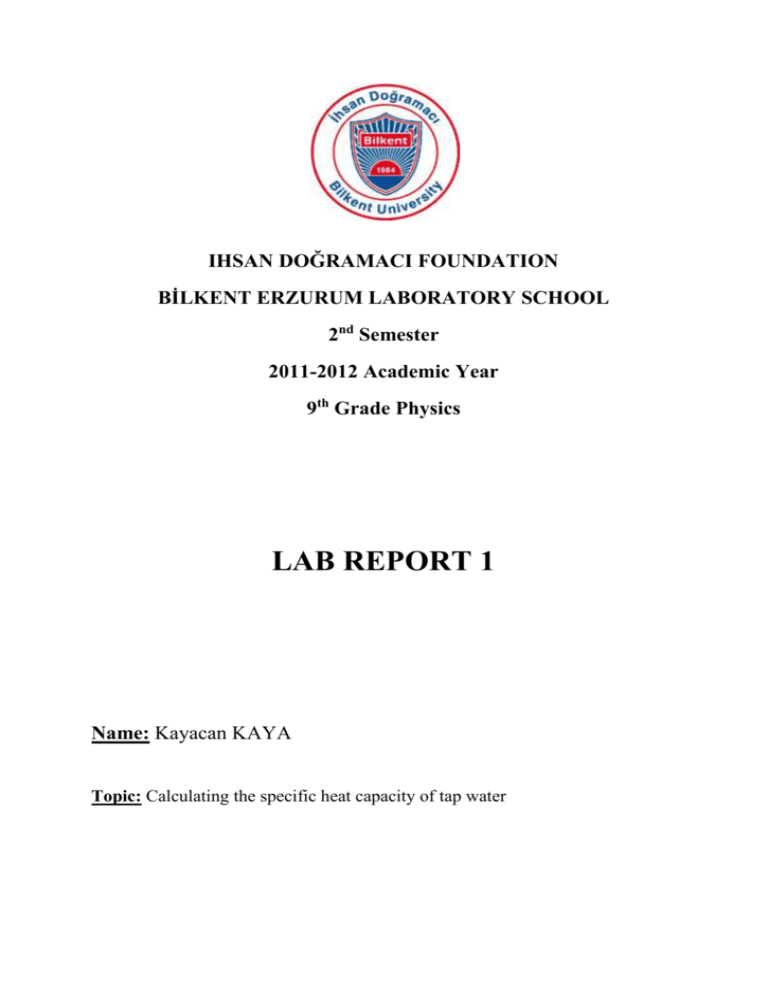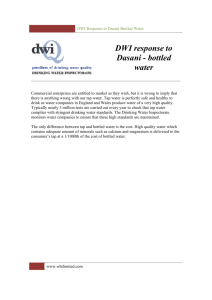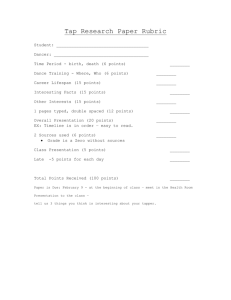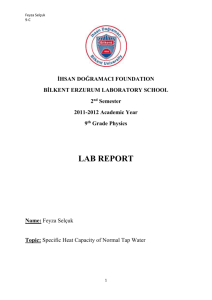Specific Heat Capacity – Lab Report
advertisement

IHSAN DOĞRAMACI FOUNDATION BİLKENT ERZURUM LABORATORY SCHOOL 2nd Semester 2011-2012 Academic Year 9th Grade Physics LAB REPORT 1 Name: Kayacan KAYA Topic: Calculating the specific heat capacity of tap water Research Question: Specific heat capacity of pure water is calculated as 4200 J/(kgoC). However, does the specific heat capacity of normal tap water change? Introduction: The specific heat capacity of a substance is defined as the heat required raising unit mass of substance by one degree of temperature. Here is our Formula : Where m is mass of substance, c is called specific heat capacity, and is change in temperature. Aim of this experiment is to find more accurate values for specific heat capacity of tap water. In order to find the energy transferred, this formula below may be used: where power is known as 1000W. Setup: Before we start to work on the experiment, laboratory , equipments and safety should be double-checked. List of Equipments: Kettle (1000W) Thermometer Stopwatch Tap Water ( kg) In order to reach more accurate results, the experiment should be repeated 4 times (perhaps more.) For each experiment, make sure that all items are ready to be used. Procedure to Follow: First of all, provide the apparatus required for the experiment. Fill the kettle with water. Make sure it weights ½ liters. Then, measure the temperature of tap water before you heat it, and note them. Determine a time by using stopwatch. Never let the water boil. Because when water boils a process called evaporation which may decrease the volume of water can appear. After the time, measure the temperature of hot tap water and write down the data again. Repeat these processes for 4 times and for each time; change the time interval. Lastly, use your datas to get find out the specific heat capacity of water. Datas: First Experiment: Time: 0 second 30th second 20oC 40 oC The specific heat capacity of tap water found in this experiment is: Energy = 45000J 45 000 J = ½ kg x c x 20oC C = 5000 J/kg oC Second Experiment: Time: 0 second 60th second 20 oC 44 oC The specific heat capacity of tap water found in this experiment is: 1000 = energy/60 Energy = 60 000 60 000 J = ½ kg x c x 24oC C = 5000 J/kg oC Third Experiment: Time: 0 second 75th second 18 oC 54 oC The specific heat capacity of tap water found in this experiment is: 1000 = energy/75 Energy = 75 000 75 000 J = ½ kg x c x 36oC C ~= 4166 J/kg oC Fourth Experiment: Time: 0 second 90th second 23 oC 63oC The specific heat capacity of tap water found in this experiment is: 1000 = energy/90 Energy = 90 000 90 000 J = ½ kg x c x 40oC C ~= 4500 J/kg oC Data Result: Experiment: Specific Heat Capacity Found: (J/kg oC) 1st 5000 J/kg oC 2nd 5000 J/kg oC 3rd 4166 J/kg oC 4th 4500 J/kg oC According to the experiments we have been working on , average specific heat capacity of tap water shown below: 4666,5 J/kg oC. Conclusion of the Experiment: Finally, as we have found out the fact that impure water (tap water) differs from pure water with its specific heat capacity. As we know tap water contains other elements like minerals and chlorine which make it different from pure water. While we are working on the experiment, amount of water should remain constant to be able to have more accurate results. We were testing the effect of time on our experiment. Therefore , change in amount of water could affect out variable in this experiment Also, we make sure that thermometer does not touch the bottom of our kettle to only estimate the temperature of water not energy coming from electricity. In order to find closer values we may repeat this experiment by using different variables.









